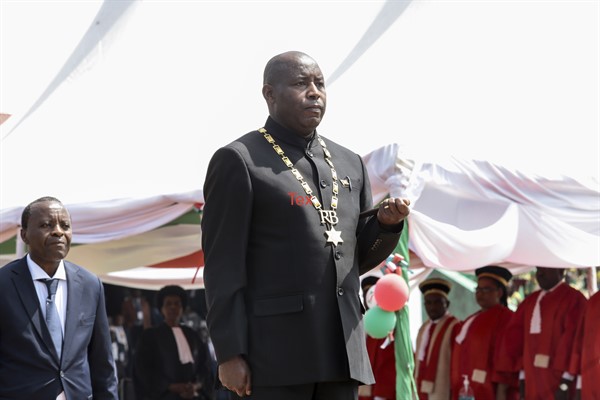On July 1, Rwandan Prime Minister Edouard Ngirente visited Burundi to mark the country’s Independence Day—the first high-level visit between the two neighbors in years. Apparently seeking to turn the page on years of sometimes violent tensions, Ngirente said, “This is the right time for Burundi and Rwanda to build on our existing strong foundation of historical and cultural linkages in order to achieve prosperity and development.” Burundian President Evariste Ndayishimeye issued a similarly forward-looking statement in response: “Let us leave the past behind, and open a new chapter.”
Only a year ago, few observers of the region would have thought such a visit possible. Burundi’s relations with neighbors like Rwanda, not to mention the international donor community, had been tense since 2015, when then-President Pierre Nkurunziza ran for a third, unconstitutional term in office in that year’s elections. Street protests broke out in the largest city, Bujumbura, which was the capital at the time, and an attempted coup by the army was narrowly defeated. Dozens of people were killed in the unrest, with hundreds more wounded or arrested. More than 300,000 people fled the country, mainly to neighboring Tanzania and Rwanda. When the African Union, the United Nations and the European Union attempted to mediate, Nkurunziza’s regime responded with contempt. Ultimately, election results showed Nkurunziza taking almost 70 percent of the vote amid an opposition boycott, handing him his third five-year term, while the ruling party secured overwhelming majorities in both houses of parliament. In the wake of the political crisis, the U.S. and EU imposed sanctions on Burundian officials.
Faced with what it perceived as international hostility, the regime adopted an isolationist stance. It vehemently opposed a decision by the AU in December 2015 to deploy peacekeepers to Burundi, forcing the AU to back down. After diplomatic talks failed to make progress, the EU in March 2016 suspended direct financial support to Burundian authorities. The government “took note” of the sanctions, which it said “risked encouraging terrorists who could interpret it as a reward for their criminal enterprise.”

